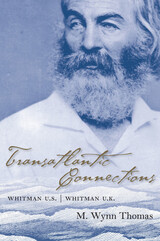
Walt Whitman stands freshly illuminated in this powerful portrait of the poet responding to his times.
Whitman’s idealistic expectations of democracy were painfully eroded by the rapidly expanding urban capitalism that, before the Civil War, increasingly threatened the economic and political power of the ordinary American. His poetry during this, his most fruitful period, became the indispensable medium allowing him to adjust to these developments. He succeeded in portraying this modern society as an invigorating natural extension of the artisanal order. After the war, however, American capitalism advanced at a pace that made it impossible for Whitman to redeem it through his poetry. His imagination defeated by realities, he invested more and more in dreams of the future, while his poetry turned to the past, Memory emerging as a central figure.
In this many-sided analysis M. Wynn Thomas relates Whitman’s work to American painting of the period; examines the poet’s evocation of nature, which he sometimes saw as a challenge to man’s confidence in himself; documents the revisions and additions Whitman made to Leaves of Grass in order to demonstrate that “my Book and the War are One”; and pays sympathetic attention to the postwar poetry, usually slighted.

The book’s contrasting sections reflect the two locations studied: the first shows Whitman in his time and place, while the second repositions him within the cultures of England and Wales from the late 19th to the late 20th century. In the opening chapter he is placed against the vivid, outrageous background of the New York of his time; the second finds evidence in his poetry of a critique of the new urban politics of the emerging city boss; the third radically redefines Whitman's relationship to his famous contemporary Longfellow. Other chapters deal with the Civil War poet, exploring the ways in which his poetic responses were in part shaped by his relationship to his soldier brother George, and his use of the meteorological discoveries of his day to fashion metaphors for imaging the different phases of the conflict.
The second section ponders the paradox that this Whitman, who was so much the product of his specific time and limited “local” culture, should come to be accepted as an international visionary. The United Kingdom is taken as offering striking instances of this phenomenon, and his transatlantic admirers are shown to have been engaged in an unconscious process of “translating” Whitman into the terms of their own culturally specific social, political, and sexual preoccupations. Some of the connections explored are those between Whitman and Edward Carpenter, the so-called English Whitman; between Whitman and perhaps his greatest English critic, D. H. Lawrence; and between Whitman and the Welsh poets Ernest Rhys, Amanwy (David Rees Griffiths), Niclas y Glais (T. E. Nicholas), Waldo Williams, Glyn Jones, Dylan Thomas, and R. S. Thomas.
This bold and original study, offering new points of entry into understanding Whitman as the product of his time and place as well as understanding the reception of Whitman in the U.K. as a process of cultural translation, should fascinate scholars of Whitman and students of comparative literature.
READERS
Browse our collection.
PUBLISHERS
See BiblioVault's publisher services.
STUDENT SERVICES
Files for college accessibility offices.
UChicago Accessibility Resources
home | accessibility | search | about | contact us
BiblioVault ® 2001 - 2024
The University of Chicago Press









